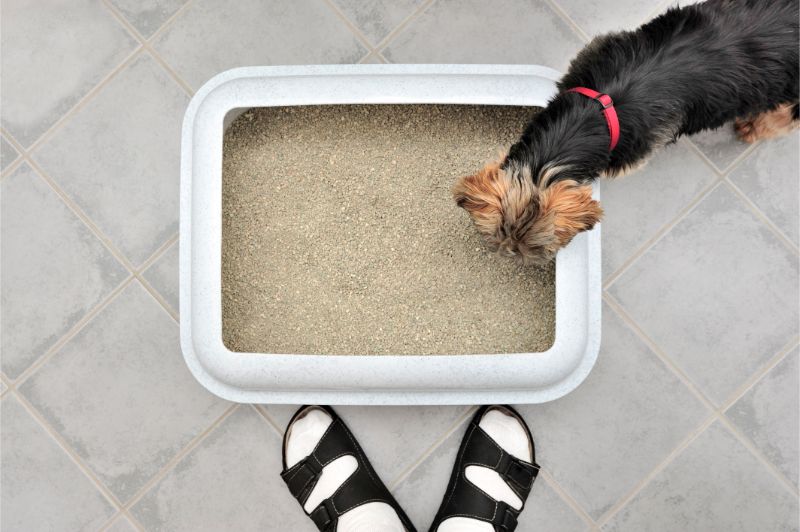Dogs Who Eat Poop, and How to Keep Your Dog Out of the Litter Box

As much as we love our dogs, there are things they do that make us cringe. Raiding the bathroom trash can, rolling in dead animals, and licking their own backsides comes to mind. But nothing beats dogs who eat poop.
If you’ve been sitting calming on the couch, minding your own business, and been the recipient of a “litter box kiss” from your dog, just know you’re not alone. The somewhat common behavior of eating out of the litter box is one that – although high on the ick factor list – is not usually something to worry about.
Keep reading as Animal Medical Hospital & Urgent Care breaks down the facts about dogs who eat poop.
Dogs Who Eat Poop
The medical term for the ingestion of feces is coprophagia. Dogs who eat poop do so for many reasons, most of which are behavioral. There may be a medical component, however, so the first step to keeping your dog out of the litter box is to make sure he’s healthy and well.
Some medical issues that could increase the desire to eat fecal matter include:
- Malabsorption disorders
- Malnutrition, or vitamin or mineral deficiency
- Increased appetite due to medication side effects or illness
- Calorie restriction/ diet
- Parasites
Still, the most common reasons for coprophagia are behavioral. There are a few theories that may fit your dog’s situation. However, there often isn’t an obvious cause for this common habit.
Dogs are scavengers and omnivores. In the wild, dogs will eat anything to survive. Your city dwelling dog still has this natural tendency, although they are well fed. You probably know dogs will eat anything – from rocks, to toys, to sticks, to clothing. We’ve seen it first hand in X-ray images at our hospital!
Puppies explore the world with their mouths, and once they have a taste of what’s in the litter box, they tend to repeat the behavior. After that initial taste, the behavior is reinforced every time they get a snack from there.
Another theory is that dogs who eat poop do so out of boredom. And most of the time, if their pet parent catches them in the act, they are showered with attention – albeit negative. When bored dogs need attention, even negative attention will do.
In puppies and mother dogs, there appears to be an instinctual drive to keep the “den” area clean. Mother dogs frequently eat the feces of their puppies, and pups sometimes clean up after one another, too. Perhaps this habit can continue from puppyhood into adulthood, and extend to the feces of other animals.
How To Keep Your Dog Out of The Litter Box
Now that you know some of the tendencies behind dogs snacking out of the litter box, what’s a pet parent to do?
Unfortunately, once the habit is formed, it’s nearly impossible to break. You may be able to scoop the box out immediately after your cat uses it, but this is often unrealistic. Instead, prevention is your best tool.
- As long as your cat can jump up, place the litter box high up off the ground where your dog can’t access it. This works well in homes with small dogs and kitties who are allowed to jump up on a shelf or cabinet.
- Invest in a dog-proof litter box or a covered litter box
- Place the box in a room with cat door access that’s too small for your dog to get through
- Use a baby gate positioned off the floor a few inches, so that your cat cat go underneath but your dog cannot follow.
- For a DIY dog proof litter box, use a storage bin with ⅓ of the top cut off. Your kitty will have a landing pad, but your dog will not be able to reach in.
Is Cat Poop Bad for Dogs?
Although disgusting, most of the time dogs who eat poop don’t get sick from it. The most common side effect is diarrhea, which should be short lived. There is however some risk of your dog coming into contact with harmful bacteria and parasites that live in cat poop. Cats need parasite control year round, just as dogs do.
If you’re concerned about your dog’s health, or have questions about keeping your dog out of the litter box, please give us a call.
